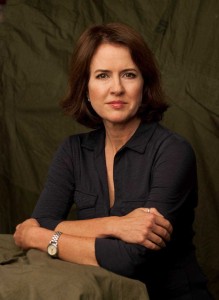
“We are certainly plugging along. It’s always quite the adventure when you have a show up and running,” commented Michelle Ashford, showrunner for Masters of Sex, the Showtime series about William Masters and Virginia Johnson, the pioneering team whose research in human sexuality during the prudish 1950s led to the sexual revolution.
Ashford first became intrigued with the subject matter that the series is based upon when her producing partner and friend of 20-years, Sarah Timberman, read a review about Thomas Maier’s biography on the researchers. Ashford was skeptical when Timberman remarked that there might be a television series in the story, however, when she read the book she was astonished not only by the in-depth examination of the careers of Masters and Johnson and the impact they had on society, but by personal information on the pair that had never before been revealed.
At one point it was suggested by the book’s author that a movie could be made from the material, but the complexity of the story leant itself to a television series. “It has been a slow build since 2000 with the Sopranos when people who were interested in complicated and detailed storytelling started to drift towards television. Now, of course, television has exploded in a way that is hard to comprehend,” noted Ashford. “We were after Mad Men, but before this recent onslaught. We got right in there during this hay day of television.”
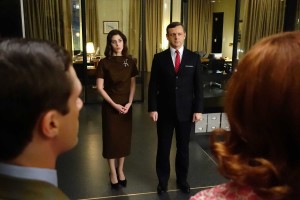
In its second season, the show has already garnered critical acclaim in several crafts.
“We hired real artists. The people that work in these less obvious roles, in terms of getting attention, are very often incredible crafts people. That is true of Ane Crabtree, our costume designer, and Michael Wylie, our production designer,” said Ashford.
Nominated for best period costumes by the Costume Designers Guild in 2014, Crabtree has shepherded the bulk of the series, creating styles that transport the viewer back to an era when professional men would rarely be seen without a suit and tie and properly dressed women wore white gloves and little hats.
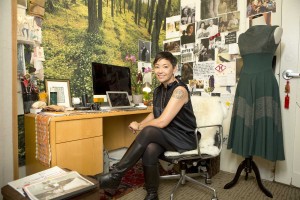
Wylie’s richly detailed production design runs the gamut from the classic warm wood of traditional buildings, to the old-fashioned gaudiness of the brothel, to the ultra-modern look of Masters’ home that could have come out of a ’50s architectural design magazine.
Commenting on that home Ashford exclaimed, “Don’t you just want to live there? We are all very envious of that house. This all comes back to the fact that the people we have hired are fastidiously accurate about evoking the mood. There is a whole team of wildly creative people that make this happen.”
On a period show it is not possible to just go out on the street and shoot as you could on a contemporary show. Everything in the frame has to be period accurate, with the proper cars, the proper light posts and the proper signage.
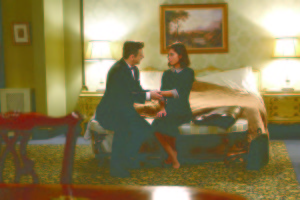
“There are so many things that you don’t think about in terms of shooting outside the lot that we try to contain things as much as possible,” explained Ashford. “We try to stay on the lot as much as possible, both for convenience, but also the money thing. We have everything there. Writing offices, producing offices, postproduction and our main sound stage is the sound stage where they shot the Emerald City in Wizard of Oz. We have an enormous space there.”
For the first two years of the show, until he broke into directing, Michael Weaver acted as cinematographer. To lens the next season, the production hired Chris Manley, the long-time cinematographer from Mad Men. When the producers were speaking with the Weaver to establish a visual style for the series, they had recently seen The Master. They felt the look of that film was beautiful.
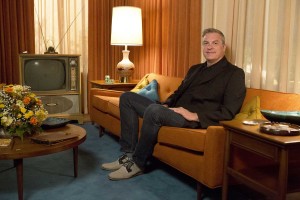
“It was shadowy, but also had beautiful, rich colors in it. When we sat down with Michael, he oddly brought up The Master as well. There was a very definite approach to how the show was going to be lit,” shared Ashford.
Because the show is shot on set, much of the lighting is pre-lit with adjustments made for each particular scene depending upon the action. In addition to being very talented, Weaver works very fast. The company uses a lot of “cross-shooting” using three cameras with both actors being covered at the same time, a major benefit on a television show with approximately eight-days to shoot an episode.
“We’re supposed to have eight days. That ended up being a little too tight, so we do a cross-over day, meaning that the last day of the episode, which would be a ninth day, is in fact the first day of the next episode. It’s a way to conserve costs while getting more shooting time in,” revealed Ashford.
One of the unsung heroes on a series is the casting director. It is a huge, labor-intensive job. Every eight days there is need for new cast members. And the producers want even the small roles to shine.
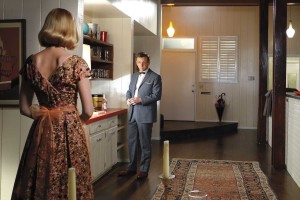
“I would say one of the people I talk the most to during my day is our casting director Risa Bramon Garcia. She comes from the theater and has done tons of stuff. She has been around for a long time and has impeccable taste,” said Ashford. “One of the things we pride ourselves on in our shows is the phenomenal acting. She is a huge part of that because she knows if we’re racing around and I say to her, ‘In this group of seven actors that we’re comparing for this role, who is really going to standout,’ she always knows. She’s always right. She’s fantastic.”
With all the actors there is a need for large hair and make-up crews. “When you are talking about a period piece, hair and make-up is incredibly difficult and incredibly important,” stated Ashford. “In fact, one of the hardest jobs on a period show is hair. This year we landed hair stylist Mary Ann Valdes, who is terrific.”
The make-up department head is Jean Ann Black, who received recognition for her work on the series with Hollywood Make-up and Hair Stylists Guild award nominations. According to Ashford, she is “extraordinary and beloved.” Unfortunately for the show, she is Brad Pitt’s make-up artist and because he is currently working, the company lost her services.
“We actually have stolen another person from Mad Men, their make-up designer Lana Grossman,” Ashford quipped, “It’s funny because it is so hard to find people who can do period stuff well, we didn’t feel too bad taking a couple of Mad Men’s people because we knew there would be a short-hand. We wouldn’t have to re-invent the wheel. They would know how to do it. That kind of efficiency with hair and make-up, if that goes fast, you can make your day. If it doesn’t, it’s kind of a mess.”
Ashford called the show very “prop-specific” and credited prop master, Jeffrey Johnson, as an essential and especially hard-working part of the team. Because the story is about sexual research, much of the show takes place in labs necessitating vintage medical machines, as well as particularly unusual devices such as the mechanical phallus used in the study. The prop master always gets them what they ask for.
“This stuff, Jeff had to create from scratch. Not only does it have to be accurate to the period, a lot of the machines have to work,” effused Ashford. “We just had a scene where Masters pulls out a set of 1930 football cards that he’s been saving since he was a child. Jeff had to go and make those cards. Our prop master is the loveliest guy on earth and honest to God, an artist like you cannot believe.”
Composer Michael Penn decided that he wanted to use instruments that were faithful to the period so that he could create an accurate sound for the score. Electronic keyboards were just starting in the fifties. Penn found a restored keyboard from that time period and has been composing on it.
“That is someone who is taking this so seriously and putting his heart and soul into the notion of how we recreate this era,” shared Ashford. “We’re working on it from a story level. We obviously interact a great deal with our creative heads, but they are in and of themselves artists. They do a tremendous amount of work and then bring it to us and ask us what we think.”
Because the show is performance driven, the editing focused on finding the emotional center of every scene. The editors – Fabienne Bouville, Blake Maniquis, Jordan Goldman and Robert Frazen – needed to have a strong understanding of what the writers were trying to do story-wise.
“It’s so much more that just assembling stuff in a way that’s pleasing. It’s about understanding what is the story, how are we telling it, how do we shade it, how do we focus it. I would say editing is the closest to writing of anything else that goes on in production. That’s one of the reasons that writers love editing. It is so much like doing a rewrite of a script,” said Ashford. “We did hire some smart and sensitive souls to tell a good story. That’s really what we’re about.”
Being on a lot that produces major feature films, makes all the postproduction technical expertise and stages available to the series. Valerie Joseph supervises the post and is very fastidious about the sound for each episode, which the editors work on for days. As each episode gets close to airtime, the producers watch it through on the sound stage, listening on gigantic speakers and giving notes until the show is polished to their tastes.
Ashford concluded, “It’s a process that has so many layers. The man-hours that it takes to get it to that spot are extraordinary. I think it is great that you are doing below-the-line stories because I don’t think people realize the amount of work that goes into even just one hour of television. And that, by the way, has to be repeated week after week. That’s the difference between movies and television. Anybody who is doing that on a television show is not only incredibly talented but has to be very fast and work really, really hard. They deserve every bit of attention that you can give them.”
Editor’s Note: Masters of Sex has been nominated for Emmy awards for outstanding production design for a narrative period program (one hour or more), outstanding guest actor in a drama series, and outstanding guest actress in a drama series.





